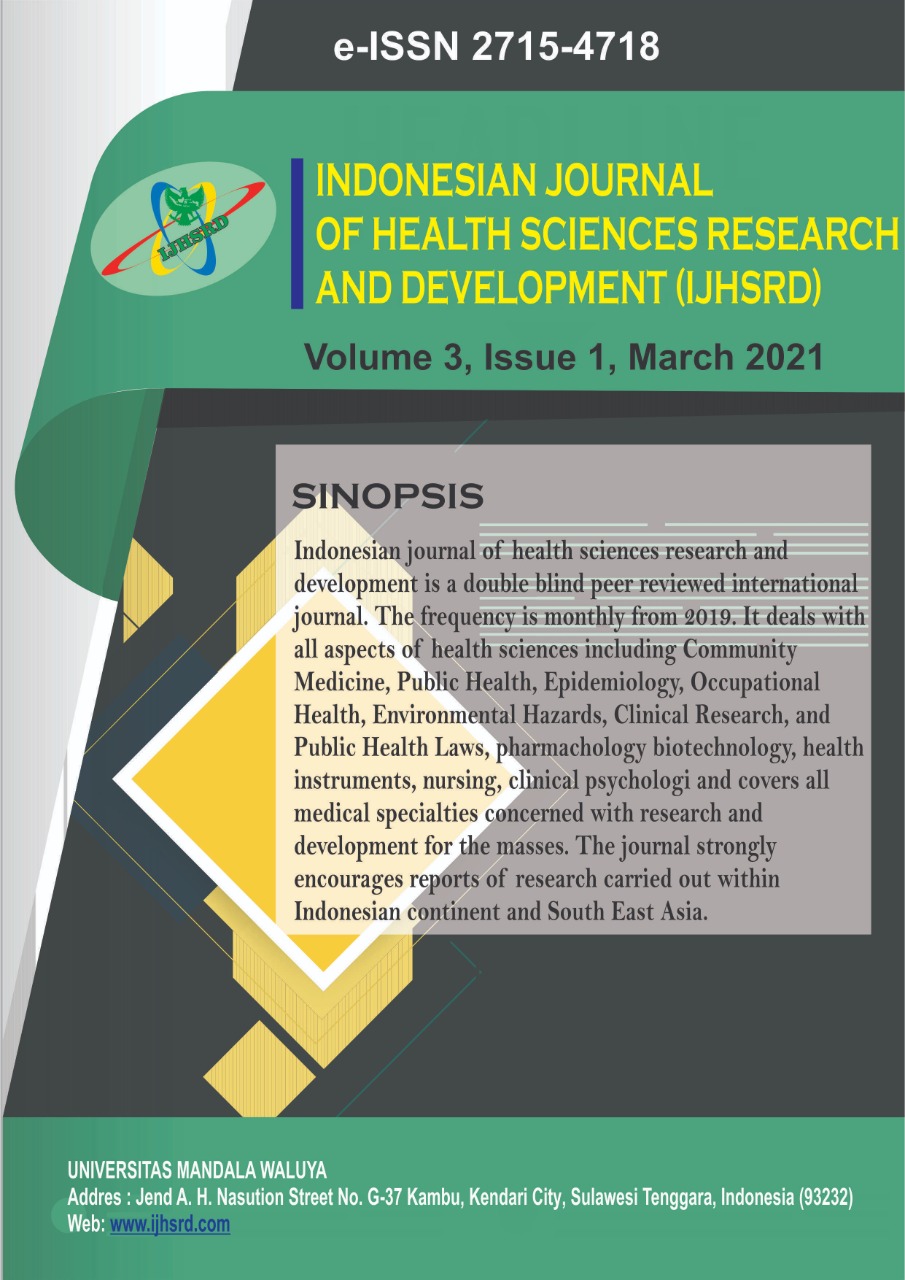Main Article Content
Abstract
Background: Increasing men's empowerment in family planning and reproductive health is needed, one of the ways is by deepening the understanding of the factors that encourage the participation of husbands as family planning acceptors. This study aims to determine the relationship between knowledge, education and husband's perceptions of family planning with the participation of husbands as family planning acceptors in Indonesia.
Methods: A cross sectional study design using the 2017 IDHS basic data with a sample of 3,751 respondents. Qualitative study on 20 husband with indepth interview also using to explore the perception on contraception. The study used univariable and bivariable analysis with Chi-square test.
Results: The results showed that the variables of husband's knowledge, education and perceptions about family planning had a significant relationship with each p-value = 0,000 smaller than ? = 0.05. Most of husband argues men should not be involved in family planning because it is related to culture and fear of side effects.
Conclusion: The low percentage of husband's participation in family planning shows that efforts to continue to increase the husband's participation rate into family planning acceptors must continue to be encouraged.
Keywords
Article Details

This work is licensed under a Creative Commons Attribution-ShareAlike 4.0 International License.
References
- Agustina, Tri R., et al. "Factors Associated with Selection of Non-IUD Contraceptive in Women of Reproductive Age in Semarang, Central Java." Mid-International Conference on Public Health 2018, Surakarta, Indonesia, April 2018. UniversitasSebelasMaret, 2018, p. 192, doi:10.26911/mid.icph.2018.03.28.
- Allen Kabagenyi, Larissa Jennings, Alice Reid, GoretteNalwadda, James Ntozi& Lynn Atuyambe 2014. Barriers to male involvement in contraceptive uptake and reproductive health services: a qualitative study of men and women’s perceptions in two rural districts in Uganda. Reprod Health .2014 Mar 5;11(1):21 doi: 10.1186/1742-4755-11-21.
- Arief. 2007. Factors Causing Husband to Choose a Condom Contraception and Not to Choose a Condom Contraception accessed on 21 sept 2020 at http://www.bascommetro.com/2011/03/faktor-penyebab-suy-choosing-kondom.html
- BKKBN. 2016. Book For Sources of Family Planning Advocacy, Reproductive Health, Gender, and Population Development. Jakarta: DirektoratAdvokasidan KIE, BKKBN, UNFPA, Bank Dunia, ADB, dan STARH.
- BKKBN. 2016. Qualified Population and Small Family Development. Jakarta: BKKBN
- Cornelius, E.S. Use of Contraception is Lacking Natural KB Stagnation. Posted September 25, 2013, accessed September 8, 2020 at http://www.metrotvnews.com
- Istiqomah, A., S. NoviantidanNurlina. 2012. Men's Participation in Family Planning in Sukamanah Village, Cipedes District, Tasikmalaya City. Journal of Siliwangi University. Tasikmalaya.
- Maharyani, H.W., dan S. Handayani. 2010. Relationship between Husband's Characteristics and Husband's Participation as a Family Planning Acceptor in Karangduwur Village, Petanahan District, Kebumen Regency, Central Java, Journal Kes Mas UAD, Vol. 4, No. 1, September.
- Marie Amouroux, Roger Miusset, Raoul Desbriere, Pierre Opinel, et.al .2018. Are the men ready to use thermal male contraception? Acceptability in two French populations. PLoSONE 13(5):e0195824.https://doi.org/10.1371/journal.pone.0195824
- Mosha I, Ruben R, Kakoko D: Family planning decision, perceptions and gender dynamics among couples in Mwanza, Tanzania: a qualitative study. BMC Public Health. 2013, 13: 523-10.1186/1471-2458-13-523.
- Omandhi-Odhiambo. 1997. Men's Participation in Family Planning Decision in Kenya. Population Studies, 51 (1997), 29-40. Printed in Great Britain.https://doi.org/10.1080/0032472031000149706
- Prabowo, A., D.K. Sari, 2011. The Relationship between Knowledge and Attitudes of Men about Family Planning with Male Behavior in Participating Using the Family Planning Contraception Method in Larangan Village, Larangan District, Brebes Regency, GASTER, Vol. 8, No. 1 (633 - 646) Februari.
- Rosliza A, Majdah M: Male participation and sharing of responsibility in strengthening family planning activities in Malaysia. Malays J Pub Healt Med. 2010, 10 (1): 23-27.
- Shahjahan M, Mumu S, Afroz A, Chowdhury H, Kabir R, Ahmed K: Determinants of male participation in reproductive healthcare services: a cross-sectional study. Reprod Health. 2013, 10: 27-10.1186/1742-4755-10-27.
- Vasra, Elita. 2009. Relationship between husband's knowledge and attitudes With the participation in KB in RT 27 and RT 45 RW 10 KelurahanKebunBunga, Sukarami, Palembang, 2009. Department of Midwifery, Health Polytechnic, Ministry of Health RI.
